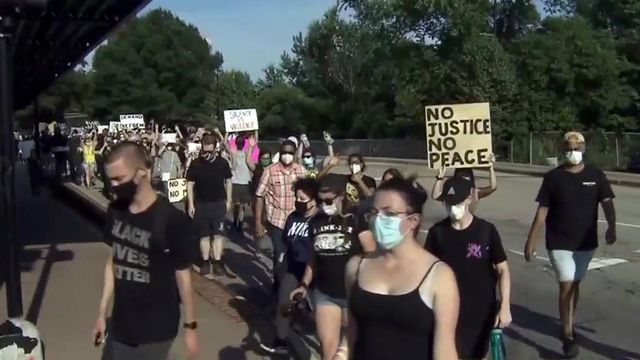Poll: More in NC say race relations getting worse
A growing segment of North Carolina residents say race relations in the state are worse than four years ago, according to the results of a WRAL News poll released Tuesday.
Posted — UpdatedSurveyUSA polled 750 people statewide between last Thursday and Sunday for the exclusive poll and also found that people aren't confident that either peaceful protests or violent ones will result in any significant changes. The results have a credibility interval of +/-4.9 percentage points.
White respondents, in particular, noted an erosion in race relations. In February, 24 percent said relations were better than four years ago, while 21 percent said they were worse. In the latest poll, only 13 percent said they were better, and 36 percent said they were worse.
For Black respondents, 50 percent say relations are worse now, up from 46 percent in February, while 13 percent say they're better, compared with 14 percent in February.
"For many whites, it’s a one-off experience. It’s a moment of crisis," said Mark Anthony Neal, the James B. Duke Professor of African and African-American Studies at Duke University. "What we see for many African-Americans is that these experiences are more systemic. They’re ongoing."
"The notion is that, for many whites, the view that racial relations are improving is dependent on whether or not African-Americans are engaged in protests or demonstrations," agreed Irving Joyner, a professor at the North Carolina Central University School of Law. "To the extent that there are a lot of protests and demonstrations, then that’s evidence to a lot of people that race relations are not improving."
People in rural areas and those who describe themselves as poor also were more likely to have a pessimistic view about race relations in the state. Only 7 percent of "poor" residents said in the latest poll that relations are better, while 55 percent said they're worse. Forty-two percent of rural residents said relations are worse, with only 11 percent calling them improved.
Conversely, 35 percent of people who classify themselves as upper middle class or wealthy said race relations are better now, with 30 percent saying they're worse.
Floyd's May 25 death while in police custody in Minnesota led to marches across the U.S. calling for an end to systemic racism, some of which became violent and led to looting and destruction of property.
When asked whether the peaceful protests will lead to changes in police actions, 38 percent said yes, 32 percent said no and 30 percent weren't sure. Regarding the violent protests, 36 percent said they would lead to changes, while 40 percent said they wouldn't and 24 percent weren't sure.
"I think most Americans really don’t have a healthy understanding or appreciation of the role that protests have played in this country historically. Whatever gains we have seen in terms of race relations since the Civil Rights Era would not have occurred without nonviolent protests," Neal said. "I think a lot of folks don’t have faith in it now because we haven’t necessarily seen that play out in recent years."
Joyner said people are "ambivalent about the impact of demonstrations."
"The truth is that the demonstration does not create a revolution," he said. "The demonstration might highlight the problem that is existing or give people an opportunity to voice their concern, but it takes real structural changes, and that comes after demonstrations."
Younger residents were more optimistic about changes coming from the protests, both peaceful and violent, than older residents, which gives Neal hope.
"There’s something that has shifted in this moment. I think it has a lot to do with many Americans feeling a sense of vulnerability because of COVID," he said. "I think there are enough young folks now who are engaged in this ongoing protest ... and we see a generation of young folks who have been committed to systemic change through nonviolent protest."
Related Topics
• Credits
Copyright 2024 by Capitol Broadcasting Company. All rights reserved. This material may not be published, broadcast, rewritten or redistributed.






